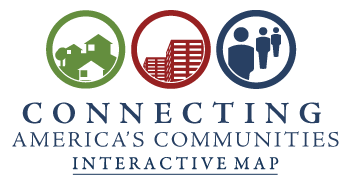Michigan

| Grantee | Total Award | Type |
|---|---|---|
| Bloomingdale Communications Inc. | $5,646,473 | Infrastructure |
| Communication Service for the Deaf, Inc. | $14,988,657 | Sustainable Adoption |
| Connected Nation (Michigan) | $4,755,684 | Broadband Data & Development |
| Eastern Upper Peninsula Intermediate School District | $3,165,207 | Sustainable Adoption |
| Merit Network, Inc. | $69,639,291 | Infrastructure |
| Merit Network, Inc. | $33,289,221 | Infrastructure |
| Michigan State University | $5,215,507 | Sustainable Adoption |
| Michigan State University | $895,482 | Public Computer Centers |
| Michigan State University | $6,056,819 | Public Computer Centers |
| One Community | $18,701,771 | Sustainable Adoption |
| One Economy Corporation | $28,519,482 | Sustainable Adoption |
| University Corporation for Advanced Internet Development | $62,540,162 | Infrastructure |
The Van Buren County Fiber Ring project is a direct response to the unmet high-speed Internet needs of the school district and local municipalities in and around Van Buren county. The project area, in southwest Michigan along Lake Michigan, demonstrates a lack of success in attracting commercial investment in broadband infrastructure.
This project expects to deploy a 147-mile network to bring speeds of between 10 Mbps and 1 Gbps to the region’s community anchor institutions. In addition, four of the computer centers to be deployed as part of the $895,000 BTOP Round One Public Computer Center award to Michigan State University will be located in libraries which intend to connect to the Van Buren Fiber Ring project.
Broadband’s ability to expand educational and employment opportunities is especially meaningful for Americans who are deaf or hard of hearing, a community that faces unique challenges in education and that suffers from a rate of unemployment much higher than the national average. Communication Service for the Deaf, Inc. (CSD) intends to expand broadband adoption among people who are deaf and hard of hearing and provide them with online tools to more fully participate in the digital economy. The project proposes to employ a combination of discounted broadband service and specialized computers, technology training from an online state-of-the art support center customized to the community’s needs, public access to videophones at anchor institutions from coast to coast, and a nationwide outreach initiative. Thousands will gain online access to all the Internet has to offer, including sign language interpreters, captioned video services, and other content and functionalities designed especially to advance their educational, employment, and healthcare interests.
Project Components
State Broadband Capacity Building:
This project will support the Michigan Broadband Task Force and the related work of the Michigan Public Service Commission (MPSC). The task force will engage and unify a diverse group of broadband stakeholders and align disparate programmatic efforts across state government. The Broadband Task Force’s overall mission includes strategic planning aspects, and the historical leadership of the PSC ensures its long-term impact.
Technical Assistance:
Connect Michigan will conduct state and county-level research to identify and track the barriers to broadband access and adoption. The results and conclusions of these surveys will be submitted to peer review and will be available for use by all stakeholders in the state.
Local Regional Technology Planning Teams:
Utilizing the strong relationships fostered by the MPSC and the more recent connections formed by the Connect Michigan mapping program, volunteer community leaders from sectors in each of the 10 economic development regions will be assembled to lead regional technology planning teams. Each of the planning teams will utilize broadband maps, research, and their own knowledge of the region’s unique needs to articulate a set of priorities which will most dramatically impact broadband and technology availability and adoption in their region. The program manager will support the team through identification of potential technical assistance resources.
Data Collection, Integration, and Validation:
This project was originally funded for broadband planning activities and two years of data collection. In September of 2010, this project was amended to extend data collection activities for an additional three years and to identify and implement best practices.
Public school students in the 7th through 12th grades in the Eastern Upper Peninsula region of Michigan lack reliable access to high-speed Internet at their schools. The Eastern UP Intermediate School District proposes to increase subscribership in the Eastern Upper Peninsula region by providing 3,500 computers with supporting software to economically disadvantaged students in Chippewa, Luce, and Mackinac Counties. Under the project, qualified families would receive vouchers for discounted broadband access through local broadband provider Lighthouse after participating in a workforce and computer training program delivered in partnership with the Tri-County Economic Development Agency and Michigan WORKS! .
The project aims to foster more advanced and robust use of technology by demonstrating the educational value of computers in the home, while communicating to parents and other community members the value of using broadband to support health, finances, and occupational training.
The REACH Michigan Middle Mile Collaborative project proposes to build a 955-mile advanced fiber-optic network through underserved counties in Michigan’s Lower Peninsula to serve institutions, businesses and households. The project will extend Merit’s 1600 miles of existing network and intends to directly connect 44 anchor institutions including libraries, universities, community colleges, and community health care centers. The open design of the proposed expansion enables all service providers to directly connect to the network to make broadband more easily available to more than 886,000 households, 45,800 businesses, and 422 anchor institutions. In addition, the proposed service area includes 86 government organizations, 69 K-12 institutions, 63 public library systems, 58 major healthcare facilities, and 50 higher education locations.
Community anchor institutions in rural northern Michigan often face high costs and/or limited Internet technology options, resulting in inadequate service for organizations in this economically distressed region. Merit Network proposes to address this problem by constructing a 1,210-mile fiber network offering speeds between 100 Mbps and 10 Gbps in Michigan’s Upper Peninsula and Lower Northern Peninsula, with additional connections to research and educational networks in Green Bay, Wisconsin and Duluth, Minnesota. Merit, whose existing network serves many of Michigan’s government, public safety, and health care organizations, plans to connect 61 anchor institutions, including public universities, community colleges, K-12 schools, libraries, health research institutions, Michigan’s Next Generation 911 system, and various local governments.
The Evidence Based Computer Center Deployment project proposes to expand 84 existing library computer centers and establish four new public computer centers that serve 15 underserved counties with high unemployment rates. The sites were selected by targeting vulnerable population areas and then focusing on those libraries with the greatest need for additional computing capacity. The project expects to add 500 new workstations at public computer centers throughout the state, serving nearly 13,000 additional users per week. The project involves major state government programs including the Michigan Economic Development Corporation, and Michigan Works! Association for job retraining, and local and county government programs to expand training and business support services.
Michigan State University plans to continue its work expanding public computer access with its Evidence Based Computer Centers II project, the second BTOP award for the University. The project proposes to partner with Lansing, Mott, and Jackson Community Colleges to upgrade and establish public computer centers, making an additional 2,200 workstations available to the public, nearly double the current number. Students from the university and community colleges who are studying system administration and network management are expected to gain hands-on experience by participating in the installation and upgrading process. The new and upgraded centers will provide online skills training and help users develop job-seeking and job-creating strategies.
Facing a structural shift away from manufacturing, Michigan suffers from high levels of unemployment and needs significant re-training for jobs in today’s economy. Michigan State University is proposing to increase broadband subscribership and use while conducting training for high school students, displaced workers, and small businesses in 11 cities across the state. In Detroit, Highland Park, and Hamtramck the project plans to train high school students in basic web design, citizen journalism, online safety, and online business development. Students in the program would then create web content for local businesses and other organizations. In Lansing, project partners plan to offer adult learners training in the practical uses of broadband technology as a bridge to later opportunities and as a prerequisite for community college courses. In Jackson, the local community college plans to tailor existing digital literacy curricula to displaced former industrial workers, training them for jobs in systems administration or network installation. The project also proposes to serve residents through training and access enhancements in Benton Harbor, Flint, Kalamazoo, Muskegon, Pontiac, and Saginaw.
The Connect Your Community (CYC) project intends to use an innovative and collaborative strategy to expand broadband adoption by almost 20,000 households in targeted communities in five states. Expanding on successful existing Cleveland-area programs, OneCommunity plans to work with non-profit and community organizations to implement neighbor-to-neighbor broadband adoption and awareness campaigns reaching 334,000 low-income individuals and to provide training and services to 33,000 people in Akron, Cleveland, and Zanesville, Ohio; Detroit, Michigan; Gulfport/Biloxi, Mississippi; Lexington, Kentucky; and Bradenton, Florida. Grant funds will enable project partners, including Urban League centers, libraries, schools, economic development agencies, and human service and housing organizations, to host computer classes and utilize online resources to fulfill their missions. The project plans to employ survey techniques to measure broadband adoption among program participants and track the program’s success over time.
The 21st Century Information and Support Ecosystem project proposes to implement a comprehensive program of computer training, wireless Internet access, broadband awareness marketing, and online content and applications to residents of 159 affordable and public housing developments and low-income communities in 50 cities and towns across 31 states and the District of Columbia. The project plans to implement four principal programs: training 2,500 youth to become “Digital Connectors” who will then provide digital literacy training to others in their communities; deploying localized broadband networks in public housing developments; developing online content and applications aimed at low-income, low-literacy audiences.
As part of a longstanding project to connect essential community anchor institutions across the country, and facilitate closer collaboration and long-term benefits for education, research, healthcare, public safety, and government services, the University Corporation for Advanced Internet Development (UCAID) proposes a comprehensive 50-state network benefitting approximately 121,000 community anchors. The project proposes a large-scale, public-private partnership to interconnect more than 30 existing research and education networks, creating a dedicated 100-200 Gbps nationwide fiber backbone with 3.2 terabits per second (TBps) total capacity that would enable advanced networking features such as IPv6 and video multicasting. The project plans to connect community anchors across all disciplines into virtual communities with shared goals and objectives, including colleges, universities, libraries, major veterans and other health care facilities, and public safety entities, with additional benefits to tribes, vulnerable populations, and government entities.









